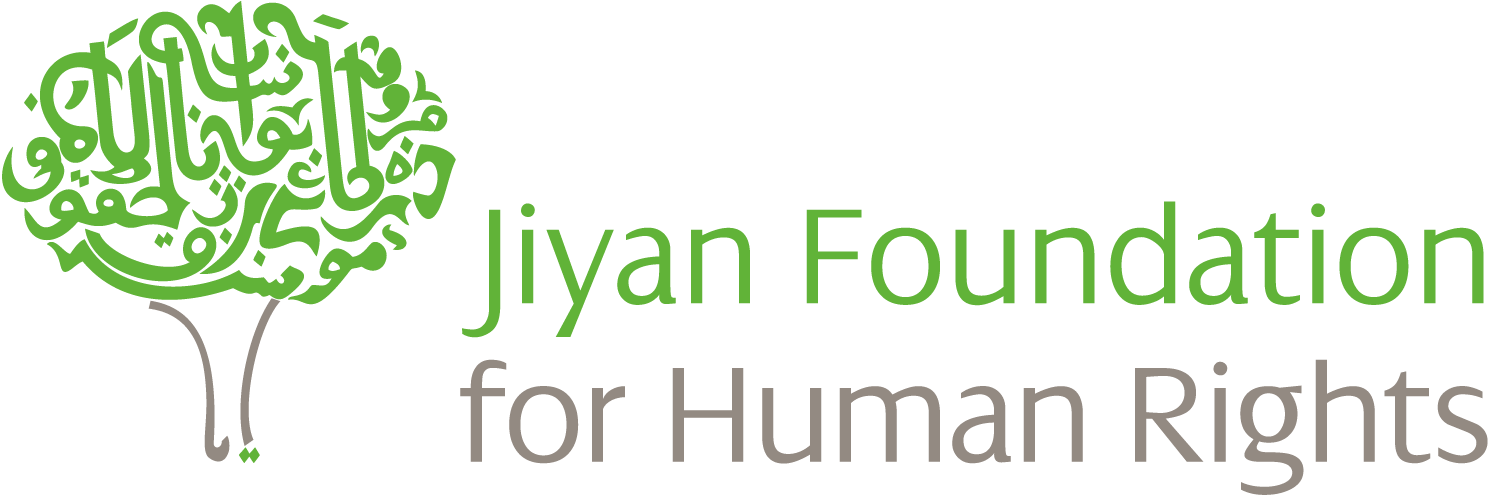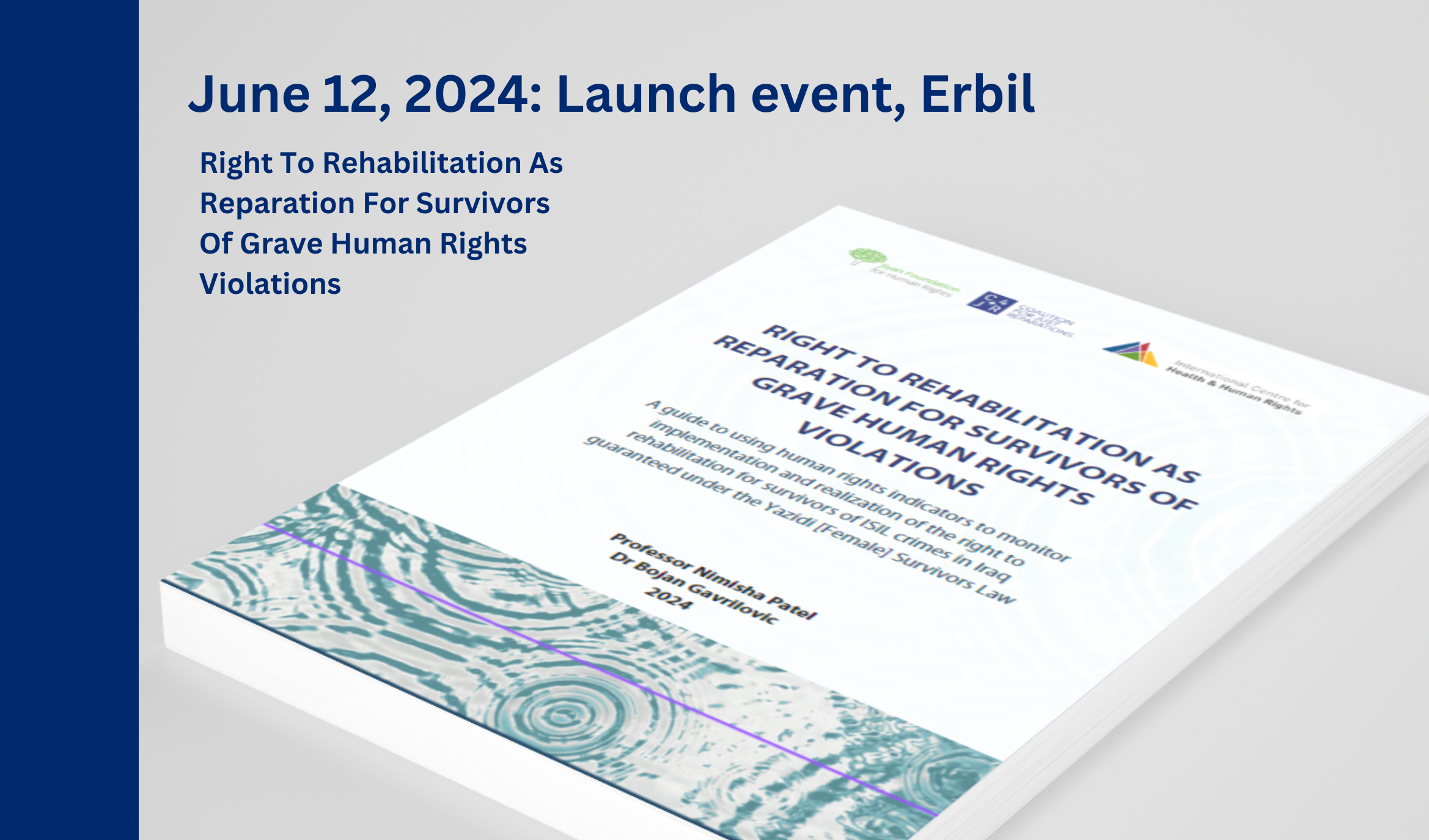ERBIL, Kurdistan Region of Iraq — The Coalition for Just Reparations (C4JR), an alliance of Iraqi NGOs calling for comprehensive reparations for survivors of atrocity crimes perpetrated during the ISIL conflict in Iraq, together with Jiyan Foundation for Human Rights and the International Centre for Health and Human Rights (ICHHR), is proud to share its latest publication, “Right to Rehabilitation as Reparation for Survivors of Grave Human Rights Violations.”
Today, Wednesday June 12, C4JR with IOM Iraq, is pleased to hold an event in Erbil to mark the launch of the guide for survivors of ISIL crimes, in the presence of Dr. Alice Jill Edwards, UN Special Rapporteur on Torture (SRT) and Other Cruel, Inhuman or Degrading Treatment or Punishment, who is in Iraq to speak with survivors about her upcoming report and receive on-the-ground feedback. Dr. Edwards is also supporting C4JR, Jiyan Foundation and other NGOs in their work on creating viable rehabilitation pathways.
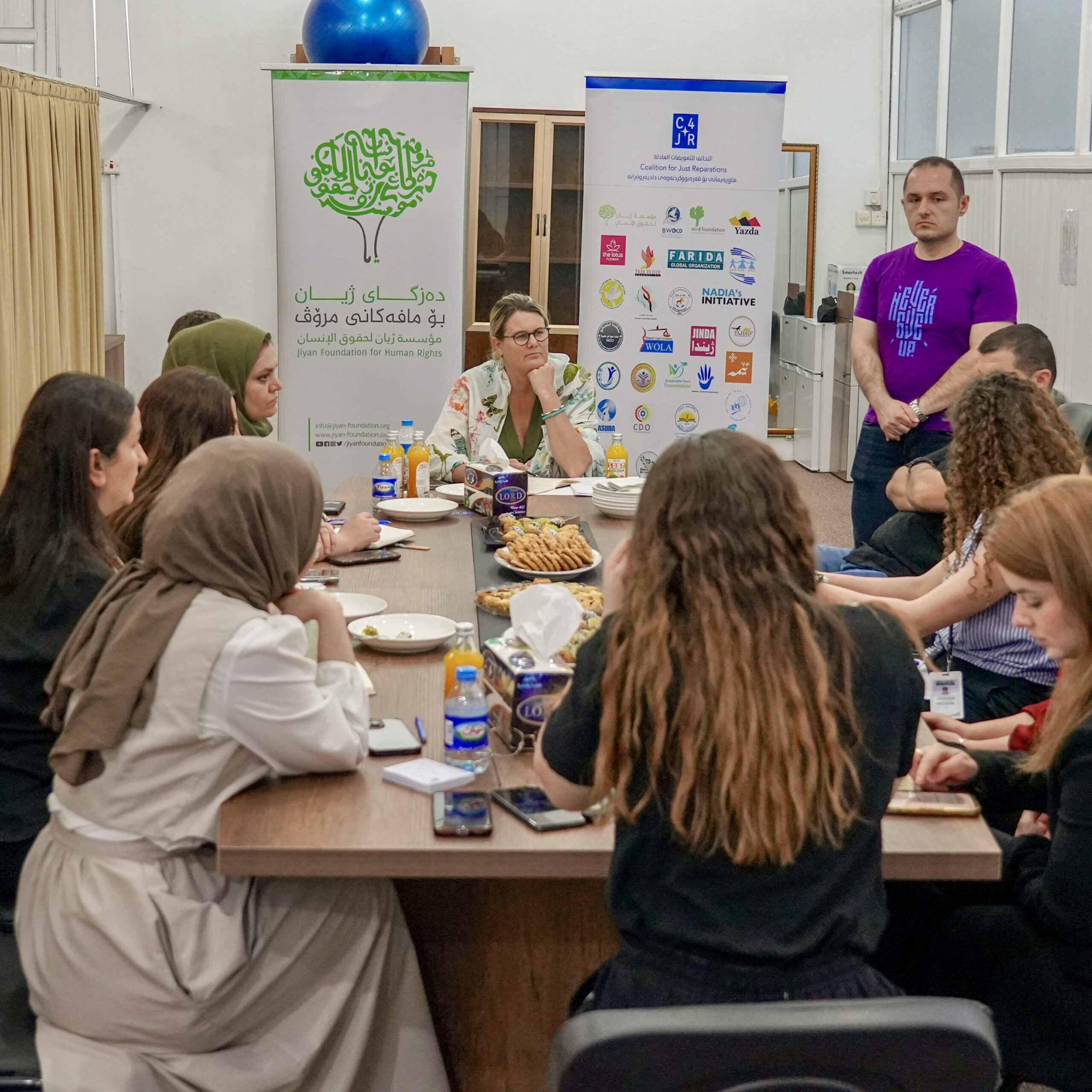
Dr. Alice Jill Edwards, UN Special Rapporteur on Torture (SRT) and Other Cruel, Inhuman or Degrading Treatment or Punishment in the Jiyan Foundation for Human Rights‘ office in Duhok, talking with survivors on Monday 10th June, 2024. Credit: Saber Saeed/C4JR
C4JR’s guide is a result of extensive research and consultations led by ICHHR’s Professor Nimisha Patel, designed to help monitor and enhance the implementation of the Yazidi [Female] Survivors Law (YSL), ensuring that survivors can access the rehabilitation services they need. The guide addresses the need for systematic monitoring and evaluation of the rehabilitation rights guaranteed to survivors of ISIL atrocities, providing tools for assessing and ensuring the implementation of rehabilitation rights as stipulated under the YSL.
Enacted on March 1, 2021, the YSL represents a significant milestone in Iraq’s post-conflict recovery, recognising rehabilitation as a vital form of reparation. The guide emphasises that realising this right requires ongoing, dedicated state efforts and provides a structured approach to evaluating these efforts.
Opening remarks will be delivered by Dr. Yousif Salih, Director of Clinical Services at Jiyan Foundation for Human Rights, and Dr. Dindar Zebari, KRG Coordinator for International Advocacy, Ms. Sherri Kraham Talabany, President of SEED Foundation, and Ms. Yoko Fujimura, Head of Erbil Office, IOM Iraq. A keynote address will also be delivered by the SRT.
A panel discussion moderated by Professor Nimisha Patel will focus on the establishment of a functional rehabilitation program under the YSL and will include participants from various organisations. Today’s event aims to provide a platform to present the guide, discuss the right to rehabilitation, and evaluate the progress and challenges of the YSL’s implementation. It will bring together Iraqi officials, international organisations, NGOs, and experts to support the survivors’ rehabilitation journey.
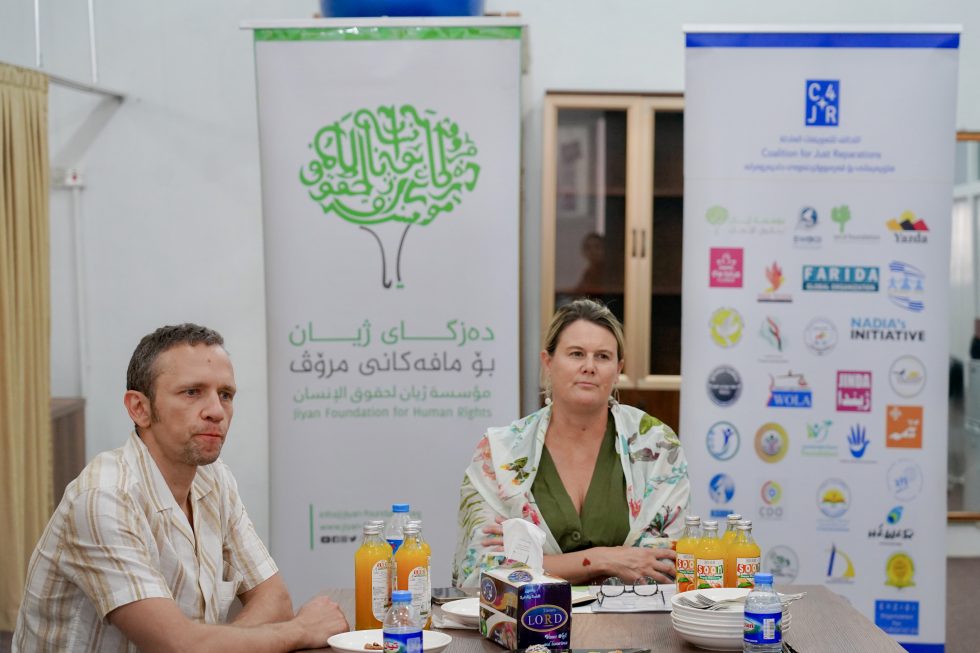
Dr. Bojan Gavrilovic, Head of Program for Rights and Justice at Jiyan Foundation/C4JR, and Dr. Alice Jill Edwards, UN Special Rapporteur on Torture (SRT) and Other Cruel, Inhuman or Degrading Treatment or Punishment in Duhok on Monday 10th June, 2024.
“Human rights indicators are needed in order to measure the gap between the human rights in theory and practice, and human rights on paper and in real life,” says Dr. Bojan Gavrilovic, Head of Program for Rights and Justice at Jiyan Foundation/C4JR. “In the context of the right to rehabilitation, promised under the YSL, we can use them to determine to which extent have quality standards for rehabilitation been translated to concrete, tangible actions on the ground,” he explained, highlighting the importance of rehabilitation indicators.
“I want to stress, that this is not a stick to blame or criticise, but it is an international tool that provides an opportunity to embark on a collective learning process which will systematically help foster improvement over time in what is provided to survivors – so that survivors can receive as full rehabilitation as possible – as a right to reparation,” Dr. Gavrilovic added.
Key Components of the Guide
- Human Rights Indicators: The guide introduces a set of human rights indicators developed by ICHHR and tailored for the Iraqi context in collaboration with the Jiyan Foundation. These indicators serve as benchmarks for assessing compliance with international standards on rehabilitation and monitoring the effective implementation of the YSL.
- Methodology: The adaptation of these indicators involved extensive stakeholder consultations conducted between June and December 2023. These consultations included survivors, Iraqi NGOs, and international experts, ensuring that the indicators are both contextually relevant and practically applicable.
- Practical Steps for Implementation: The guide provides a step-by-step approach to using these indicators, including:
– Establishing a monitoring team with relevant expertise.
– Designing and implementing a data collection and recording system.
– Analysing and interpreting the collected data to produce actionable reports.
– Using these reports to inform advocacy and drive state efforts towards fulfilling rehabilitation obligations. - Stakeholder Involvement: Another significant aspect of the guide is its emphasis on involving survivors in the monitoring process. By incorporating their experiences and feedback, the guide ensures that rehabilitation services are aligned with the actual needs and preferences of survivors.
Expected Outcomes of the Guide’s Implementation
- Enhanced Accountability: By using standardised indicators, it is our hope that stakeholders can hold the Iraqi government accountable for its obligations under YSL.
- Improved Rehabilitation Services: The guide’s structured approach aims to identify gaps and areas needing improvement, thereby enhancing the quality and accessibility of rehabilitation services for survivors.
- Informed Advocacy: Data-driven reports generated using the guide will provide a solid foundation for advocacy efforts, helping to direct resources and attention to the most pressing needs.
- Survivor-Centered Approach: Ensuring that the voices of survivors are central to the monitoring process will lead to more responsive and effective rehabilitation programs.
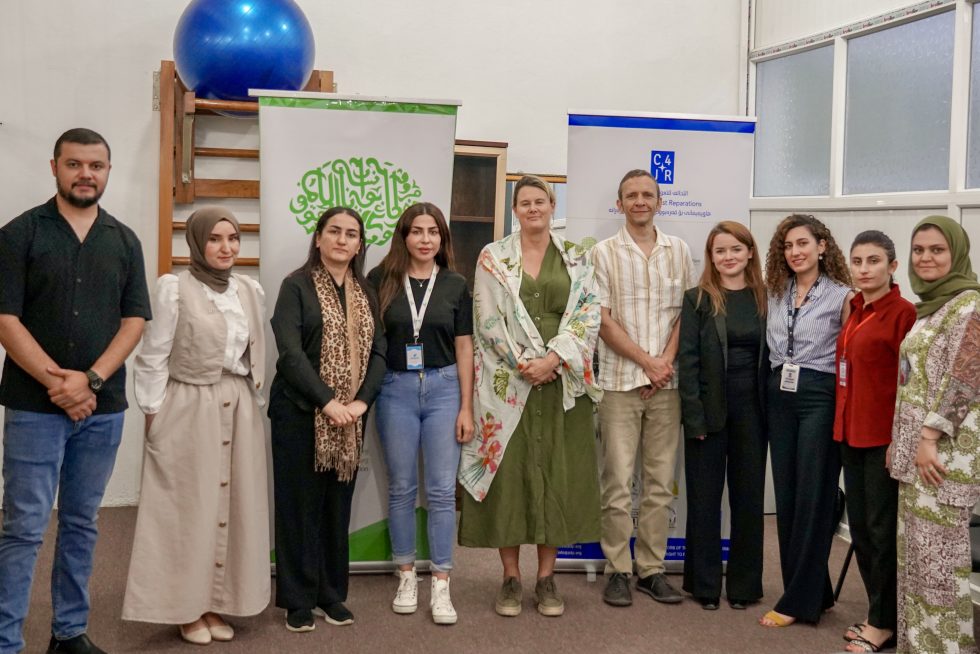
Members of the Coalition for Just Reparations (C4JR) including Yazda, DAK, and Better World Organisation, with Dr. Alice Jill Edwards, UN Special Rapporteur on Torture and Other Cruel, Inhuman or Degrading Treatment or Punishment, on Monday 10th June, 2024.
Coinciding with UN Special Rapporteur's Thematic Report
Earlier this month, C4JR was proud to share our submission to the United Nations Special Rapporteur on Torture and Other Cruel, Inhuman or Degrading Treatment or Punishment, for her forthcoming thematic report about crimes of sexual torture and other ill-treatment committed during armed conflict, including ensuring remedies and rehabilitation of victims and survivors. All victims of torture, ill-treatment or other gross human rights violations have a right to rehabilitation under international law.
Since 2012, there have been significant positive developments in the normative understanding of and political support for survivors’ right to rehabilitation as a form of reparation. Internationally, the UN Committee against Torture has adopted General Comment No. 3 and the UN Human Rights Council adopted resolution 22/21 on rehabilitation.
At the national level, states are increasingly adopting legislation, policy guidelines and action plans that comprise a specific right to rehabilitation as a form of reparation for survivors and their families. The pioneering YSL envisages, for the first time in Iraq, rehabilitation as a form of reparation. More precisely, an official aim of the YSL is to rehabilitate survivors and integrate them into society. This is to be done by opening health and psychological rehabilitation centres where survivors shall access adequate rehabilitation services. Dr. Edwards’ visit to Iraq underscores the importance of international cooperation and the collective effort needed to address and support survivors of torture and other grave human rights violations.
